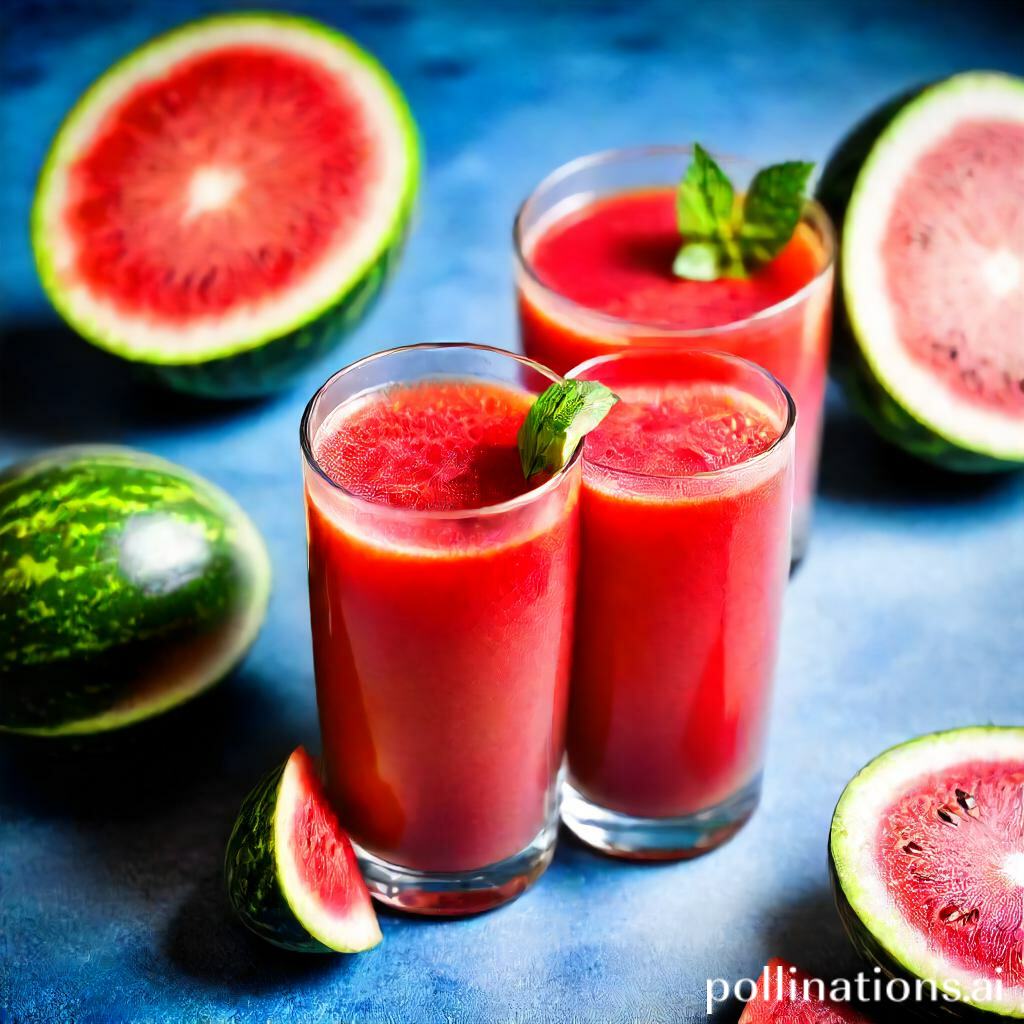Is Watermelon Juice Good For You?
You can’t help but wonder if watermelon juice is good for you. At the same time people are searching for answers, there’s so much more to discover about the potential health benefits and nutritional value of this refreshing drink.
Like a burst of summer flavor, watermelon juice can quench your thirst and leave you feeling revitalized. Read on to find out what makes watermelon juice a healthy choice and how it can contribute to your overall well-being.

Table of Contents
The Nutritional Benefits of Watermelon Juice
Watermelon juice is packed with essential vitamins and minerals that contribute to overall health. It is a rich source of vitamin C, which boosts the immune system and promotes collagen production for healthy skin. The juice also contains vitamin A, which supports eye health and immune function. Additionally, it provides a good amount of potassium, which helps maintain proper electrolyte balance and supports heart health.
1. Vitamins and Minerals in Watermelon Juice
Watermelon juice is rich in vitamin C, which boosts the immune system and promotes healthy skin. It also contains vitamin A, which supports eye health and immune function. Additionally, it provides a good amount of potassium, which helps maintain proper electrolyte balance and supports heart health.
2. Antioxidants in Watermelon Juice
Watermelon juice is a great source of antioxidants, including lycopene and beta-carotene. Lycopene, which gives watermelon its red color, has been associated with a reduced risk of certain types of cancer. Beta-carotene is converted into vitamin A in the body and helps protect against oxidative stress and cellular damage.
3. Hydration Benefits of Watermelon Juice
Watermelon juice is an excellent choice for staying hydrated due to its high water content. Proper hydration is essential for maintaining bodily functions, regulating body temperature, and supporting overall health. Drinking watermelon juice can help replenish fluids and electrolytes lost through sweat, making it a refreshing and hydrating option, especially during hot summer months or after physical activity.
Expert Tips:1. Get your daily dose of vitamins and minerals with watermelon juice.
2. Boost your antioxidant intake by enjoying a glass of watermelon juice.
3. Stay hydrated and refreshed with watermelon juice, especially during hot summer months.
Health Benefits of Drinking Watermelon Juice
1. Boosts Immune System
Watermelon juice is rich in vitamin C, which plays a vital role in boosting the immune system. Regularly consuming watermelon juice can help strengthen your body’s defense against infections and illnesses.
2. Supports Heart Health
Drinking watermelon juice can have positive effects on heart health. It contains lycopene, an antioxidant that has been linked to a reduced risk of heart disease. Lycopene helps lower cholesterol levels and improves blood flow, promoting a healthy cardiovascular system.
3. Helps with Weight Loss
Watermelon juice is a hydrating and low-calorie beverage, making it a great option for those looking to shed some extra pounds. It is naturally sweet and can help satisfy cravings for sugary drinks At the same time providing essential nutrients and hydration.
4. Improves Digestion
The high water content and fiber in watermelon juice can aid in digestion. It helps prevent constipation and promotes regular bowel movements. Additionally, watermelon juice contains natural enzymes that assist in breaking down food, making it easier for the body to absorb nutrients.
5. Reduces Inflammation
Watermelon juice contains compounds like citrulline and lycopene, which have anti-inflammatory properties. Regular consumption of watermelon juice may help reduce inflammation in the body, potentially benefiting conditions such as arthritis and muscle soreness.
| Health Benefits of Drinking Watermelon Juice |
|---|
| 1. Boosts Immune System |
| 2. Supports Heart Health |
| 3. Helps with Weight Loss |
| 4. Improves Digestion |
| 5. Reduces Inflammation |
How to Make Watermelon Juice at Home
1. Choosing the Right Watermelon
When making watermelon juice at home, it’s important to select a ripe and flavorful watermelon. Follow these tips to choose the perfect watermelon:
- Appearance: Look for a watermelon with a dark green skin and a dull surface. Avoid watermelons with cuts, bruises, or soft spots.
- Weight: Pick up the watermelon and make sure it feels heavy for its size. A ripe watermelon will be heavier due to its high water content.
- Sound: Tap the watermelon and listen for a deep, hollow sound. If it sounds dull or muffled, the watermelon may be overripe.
2. Preparing the Watermelon
Before juicing the watermelon, it’s important to prepare it properly. Follow these steps:
- Wash: Rinse the watermelon under cold water to remove any dirt or debris from the surface.
- Cut: Use a sharp knife to cut off both ends of the watermelon. Then, stand it upright and slice off the rind in downward motions, following the curve of the fruit.
- Remove Seeds: If your watermelon has seeds, you can either remove them with a spoon or choose a seedless variety.
- Cut into Chunks: Cut the watermelon flesh into small, manageable chunks that can easily fit into your juicer.
3. Juicing Techniques
There are several methods you can use to juice the watermelon. Choose the one that suits your preference and equipment:
- Blender Method: Place the watermelon chunks in a blender and blend until smooth. You can strain the juice if desired.
- Juicer Method: Feed the watermelon chunks into a juicer and collect the extracted juice. Strain the juice to remove any pulp.
- Manual Method: If you don’t have a blender or juicer, you can manually extract the juice by mashing the watermelon chunks with a fork or using a hand juicer.
Making watermelon juice at home is a refreshing and healthy way to enjoy the natural sweetness of this fruit. You can experiment with different variations by adding mint leaves, lime juice, or blending it with other fruits for a unique flavor. Cheers to your homemade watermelon juice!

Is Watermelon Juice Good For You?
Potential Side Effects of Watermelon Juice
Watermelon juice is generally considered a healthy beverage option. Notwithstanding, it is important to be aware of potential side effects that may arise from its consumption. It is advisable to consult with a healthcare professional before making any significant changes to your diet, especially if you have any pre-existing health conditions.
1. Digestive Issues
Some individuals may experience digestive issues after consuming watermelon juice. These issues can include bloating, gas, or an upset stomach. The severity of these effects may vary from person to person and can be influenced by factors such as the quantity of juice consumed and an individual’s tolerance to certain compounds found in watermelon.
2. Allergic Reactions
In rare cases, individuals may have an allergic reaction to watermelon juice. Symptoms of an allergic reaction can range from mild to severe and may include itching, swelling, hives, or difficulty breathing. If you experience any of these symptoms after consuming watermelon juice, it is important to seek immediate medical attention.
3. Blood Sugar Concerns
Watermelon juice can have a high glycemic index, which means it can cause a rapid increase in blood sugar levels. This can be a concern for individuals with diabetes or those who need to monitor their blood sugar levels. It is recommended to consume watermelon juice in moderation and as part of a balanced diet to avoid any adverse effects on blood sugar levels.
| Potential Side Effects of Watermelon Juice |
|---|
| 1. Digestive Issues |
| 2. Allergic Reactions |
| 3. Blood Sugar Concerns |
It is important to note that the potential side effects mentioned above do not imply that everyone will experience them. Each individual’s response to watermelon juice may vary, and it is essential to listen to your body and make informed decisions about your dietary choices.
Benefits of Adding Watermelon Juice to Your Diet
1. Improved Hydration and Nutrition
Stay refreshed and hydrated with watermelon juice, especially during hot summer months. With its high water content of about 92%, watermelon juice helps replenish fluids in your body, keeping you hydrated and ensuring proper bodily functions. It is also packed with essential vitamins and minerals like vitamin C, vitamin A, potassium, and magnesium.
2. Support for Heart Health
Regularly consuming watermelon juice can promote cardiovascular health. Studies have shown that watermelon contains an amino acid called citrulline, which helps relax and dilate blood vessels, improving blood circulation and reducing blood pressure. Additionally, the presence of lycopene, a powerful antioxidant, in watermelon juice may lower the risk of heart disease.
3. Potential Anti-Inflammatory Benefits
Watermelon juice contains compounds that have potential anti-inflammatory properties. One such compound is lycopene, which has been found to reduce inflammation markers in the body. Through convergence watermelon juice into your diet, you can help combat inflammation and potentially reduce the risk of chronic diseases associated with inflammation, such as arthritis and certain types of cancer.
4. Weight Management and Digestive Health
Watermelon juice is low in calories and fat, making it a suitable choice for weight management. The natural sugars present in watermelon juice provide a sweet taste without excessive calories. Additionally, the high water and fiber content of watermelon juice can aid in digestion, preventing constipation and promoting a healthy digestive system.
5. Versatile Culinary Uses
Adding watermelon juice to your diet opens up a world of culinary possibilities. You can try out various recipes, including watermelon juice smoothies, detox drinks, and mocktails. These creations not only offer a flavorful experience but also provide the nutritional benefits of watermelon juice, making it a versatile addition to your daily routine.
Conclusion
Watermelon juice can be a refreshing and nutrient-rich addition to your diet. Packed with vitamins A and C, as well as antioxidants, it may contribute to a strong immune system and healthy skin.
Additionally, its high water content helps to keep you hydrated. Despite this, it’s important to consume watermelon juice in moderation due to its natural sugar content. At the same time it can be a healthy choice, it should not replace a balanced diet. As with any food or drink, it’s always best to consult with a healthcare professional to determine how watermelon juice can fit into your overall nutrition plan.
FAQ about Watermelon Juice
FAQ 1: Is watermelon juice good for hydration?
Watermelon juice is an excellent choice for hydration. With its high water content of about 92%, it helps replenish fluids in the body and keeps you hydrated.
FAQ 2: Can watermelon juice help with weight loss?
Watermelon juice can be beneficial for weight loss. It is low in calories and packed with essential nutrients, making it a healthy and filling option. Nonetheless, it’s important to consume it in moderation as part of a balanced diet.
FAQ 3: Can watermelon juice improve skin health?
Watermelon juice can contribute to improved skin health. It contains vitamins A and C, which are essential for maintaining healthy skin. These vitamins help promote collagen production, protect against sun damage, and contribute to a youthful appearance.
FAQ 4: Is watermelon juice safe for diabetics?
Watermelon juice can be consumed by diabetics in moderation. Meanwhile watermelon does contain natural sugars, its glycemic index is relatively low. Nonetheless, individuals with diabetes should monitor their blood sugar levels and consult with a healthcare professional before incorporating watermelon juice into their diet.
FAQ 5: Are there any precautions when consuming watermelon juice?
When consuming watermelon juice, it is important to be mindful of a few precautions. Due to its high sugar content, excessive consumption may lead to increased blood sugar levels. Additionally, some individuals may experience digestive discomfort or allergies. It’s recommended to start with small amounts and observe how your body reacts before consuming larger quantities.
Read Similar Post:
1. Boost Hydration, Improve Digestion & More: Unveiling the Benefits of Watermelon Juice
2. Preserving Freshness: How to Freeze Watermelon Juice and Make the Most of It

